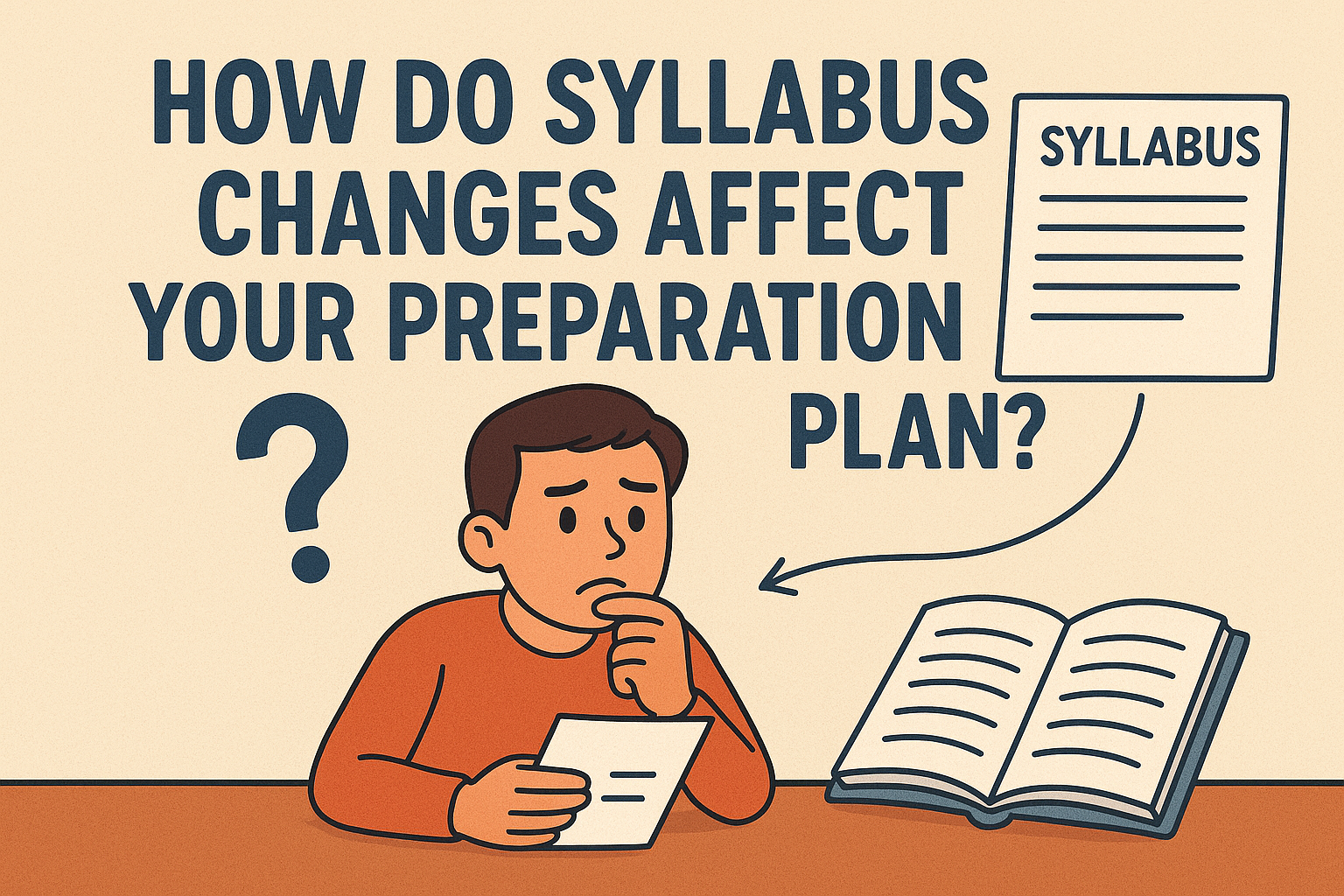Every academic year brings changes, new patterns, revised chapters, and sometimes an entirely new syllabus. While these syllabus changes are usually intended to make learning more relevant, they can also impact how students design their study plans, prepare for exams, and manage their study strategy.
The acquaintance of how to evolve with these changes makes you remain positive, current, and competent in your learning process.
Why Do Education Boards Change the Syllabus?
Boards such as CBSE, UGC, and AICTE regularly revise the exam syllabus to make education more aligned with current developments. The goal is not just to add or remove topics but to make the learning process more skill-oriented and practical.
| Reason for Syllabus Change | Objective | Impact on Students |
|---|---|---|
| Alignment with NEP 2020 | Promote conceptual learning and critical thinking | A broader understanding of subjects |
| Technological Advancements | Introduce AI, data science, and digital literacy | New topics and tools to learn |
| Global Curriculum Standards | Match international benchmarks | Improved global opportunities |
| Reducing Academic Burden | Remove repetition and outdated chapters | Balanced workload |
| Practical Relevance | Focus on application-based content | Better employability skills |
These reasons show that syllabus updates are not meant to make exams tougher but to make education more meaningful and career-ready.
How Syllabus Changes Affect Your Study Plan
A syllabus change has a direct impact on your study plan and exam preparation. You may find some subjects easier due to reduced content or more demanding because of additional topics.
| Type of Change | Effect on Study Plan | Action Required |
|---|---|---|
| Addition of new topics | Increases workload | Extend your study schedule and allocate extra time |
| Removal of old chapters | Reduces study content | Re-focus on core topics and high-weightage areas |
| Pattern or format change | Alters practice style | Attempt mock tests with new question formats |
| Revised weightage | Shifts focus areas | Update your study strategy accordingly |
A smart student always compares the new syllabus with the old one before starting preparation. It prevents wasted effort on outdated material.
Rebuilding Your Study Plan After a Syllabus Change
When a new syllabus is introduced, restructuring your study schedule becomes essential. Here’s how you can adapt effectively:
| Step | Action | Purpose |
|---|---|---|
| Step 1 | Download the latest exam syllabus from official portals like CBSE Academic, NTA, or UGC | Verify authenticity |
| Step 2 | Compare with the old syllabus | Identify added and removed chapters |
| Step 3 | Adjust your study plan | Reassign time for new topics |
| Step 4 | Revise your timetable | Maintain balance between old and new content |
| Step 5 | Update your resource list | Use the latest reference books and guides |
| Step 6 | Test your knowledge | Take weekly tests to monitor adaptation |
This process ensures that your preparation remains structured, efficient, and up to date with the latest requirements.
Effective Study Strategy to Handle Syllabus Changes
Adaptability and flexibility are key components of a successful study method. You must carefully modify your approach because every syllabus change affects both what and how you study.
| Focus Area | Recommended Strategy |
|---|---|
| Time Allocation | Divide study hours between new and existing topics |
| Concept Clarity | Start with official materials like the NCERT or NTA study guides |
| Practice | Use mock tests following the new syllabus |
| Revision | Shorten revision cycles for better recall |
| Resource Verification | Refer to government portals only for confirmed updates |
| Guidance | Use academic counseling platforms like Infigon Futures for expert direction |
Recall that consistency, not simply diligence, is the key to successful exam preparation. You have a competitive advantage if you can swiftly adjust to changes in the syllabus.
Sample Study Schedule for a New Syllabus
You can effectively organise your preparation following a syllabus update by using the study regimen that follows:
| Week | Focus Area | Goal |
|---|---|---|
| Week 1 | Analyze the old vs the new syllabus | Identify major changes |
| Week 2 | Adjust your study plan | Allocate time to new topics |
| Week 3 | Revise core subjects | Strengthen fundamentals |
| Week 4 | Take chapter-wise mock tests | Assess progress |
| Week 5 | Revise using the latest notes | Focus on high-weightage chapters |
| Week 6 | Attempt full-length papers | Build exam stamina |
| Week 7 | Review mistakes | Make final corrections |
This adaptable timetable guarantees thorough coverage while keeping priorities clear.
Importance of Tracking Updates on Official Portals
Confusion may result from students' frequent reliance on secondary sources for syllabus revisions. For correct information, always visit official websites.
| Portal | Purpose |
|---|---|
| NTA (National Testing Agency) | For competitive exams like JEE, NEET, CUET |
| CBSE Academic Portal | For the school board syllabus and sample papers |
| UGC (University Grants Commission) | For university syllabus updates |
| AICTE (All India Council for Technical Education) | For technical and engineering syllabus reforms |
| Infigon Futures | For career guidance, personalized study planning, and skill-based learning tools |
You can arrange your preparation in accordance with the most recent standards by routinely using these portals.
FAQs
Q1. What is a change in the syllabus?
ANS. A syllabus shift occurs when some topics are added or eliminated from the exam syllabus, requiring us to study new material.
Q2. Why do educational institutions create new curricula?
ANS. Schools create new curricula to assist pupils learn more effectively for tests, future employment, and simple study.
Q3. What impact does a change in the curriculum have on my study schedule?
ANS. When the syllabus is altered, we must adjust our study strategy and start with the new chapters in order to prepare for the test.
Q4. When the exam syllabus changes, what should I do?
ANS. To study every subject, review the updated syllabus, pay attention to the teacher's notes, and create a straightforward study plan.
Q5. How can I create a study plan for the updated curriculum?
ANS. Plan time, write subjects, study every day, make frequent revisions, and maintain a simple yet effective study routine.
Q6. How can exam preparation be aided by a new syllabus?
ANS. A new syllabus enables us to study pertinent subjects so that we are well-prepared for exams.
Q7. How should I study now that the syllabus has changed?
ANS. Starting new topics first, reviewing previous ones, and adhering to a straightforward study timetable are the best study techniques.
Q8. Who provides us with the accurate exam syllabus?
ANS. The proper exam syllabus is shared by school teachers and government websites such as CBSE, NTA, and CAT.

